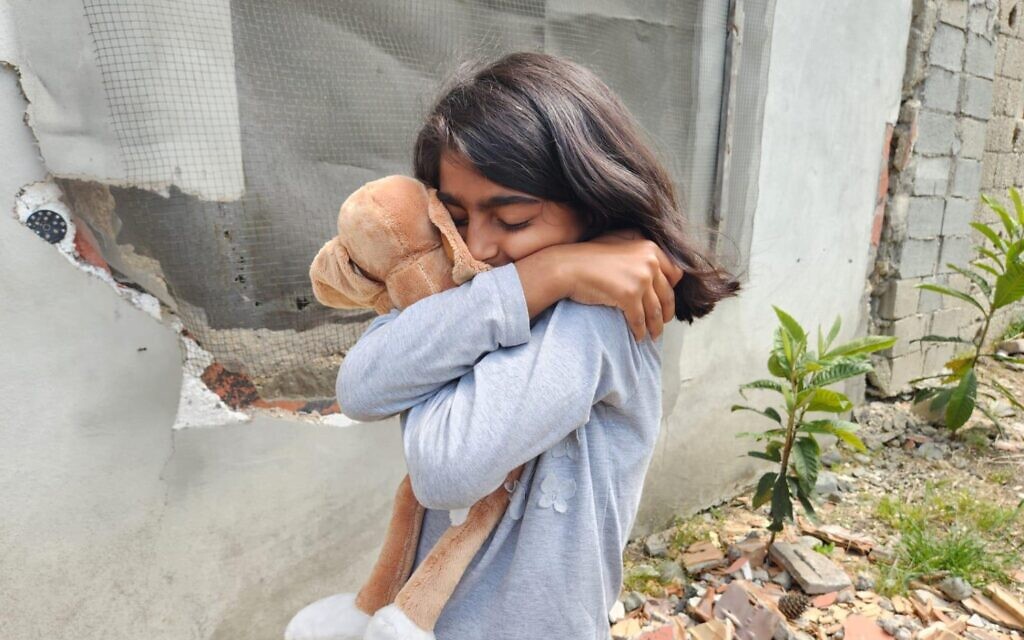The cuddly toy taking away Israel’s trauma
Traumatised by October 7, Israeli children are being given a toy that has helped other young survivors of terror.
The children who survived the attacks of October 7 no longer play mums and dads in the playground – there are no cups of coffee or lemonade for the teddies. Instead, they speak in whispers. “Ssshh, we need to be quiet, there are terrorists outside.” Occasionally one will pop their head out of a makeshift door. “It’s okay, they’ve gone.”
Those who were not immediately affected are still not the same. At their schools, they are recreating the sounds of bombs and sirens. They are pretending to run to safe rooms and hide. This is the new norm.
“Children re-enact their experiences through play,” says Dr Flora Mor, who has been working with the evacuated and traumatised families for the humanitarian agency JDC. “People see children as adaptable – and think that because they don’t understand something they don’t experience it in the same way; they will be fine if the parent pretends things are fine.” But they are not. No one in Israel is fine.
Get The Jewish News Daily Edition by email and never miss our top stories Free Sign Up
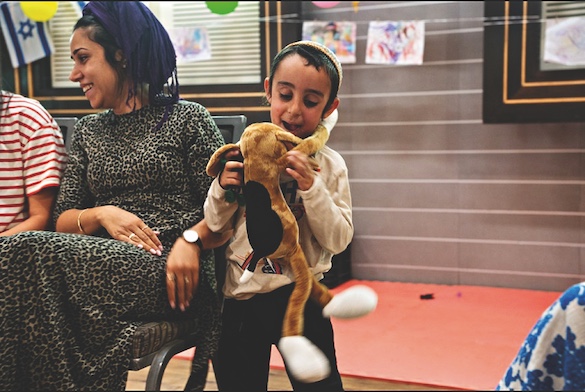
Flora knows trauma – Israel has been in enough wars – but she says nothing she has experienced has been “like what we are seeing now in terms of scale, tremendous pain and trauma”. And that, of course, impacts the children. “The children aren’t as good at vocalising how they feel, so there is a lot of separation anxiety, bedwetting and nightmares. They are very closed off or aggressive. They don’t know how to be themselves. It’s like some of them have forgotten how to play; they are so stressed.”
It was during the first Lebanon War that she, alongside the Tel Aviv University and the Israeli Ministry of Education, devised something to help them and their parents cope – a rather magical toy called the Hibuki doll. It looks like a giant dog with oversized arms and legs that can be strapped onto children with Velcro patches giving them a big hug – the name
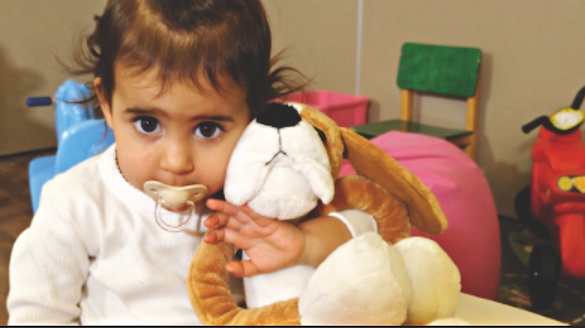
comes from the Israeli word for hug. The dog has a sad face – droopy eyes, turned-down lips – which is deliberate. One of the multifaceted ways the Hibuki helps children is that in trying to cheer it up, they make themselves laugh. Children immediately feel more responsible when they are looking after another creature.
And while the young children who have a Hibuki might struggle to communicate to their parents how they are feeling – particularly if they know that could make their also-traumatised parents sadder – by transferring their emotions onto the doll, they explain everything. The child talks to the doll and that way the parent can learn what the child is feeling.
Sometimes the child refuses to touch Hibuki or will hit it or throw it down violently – that too is an important sign that help is needed. And the parents are taught how to give that help.
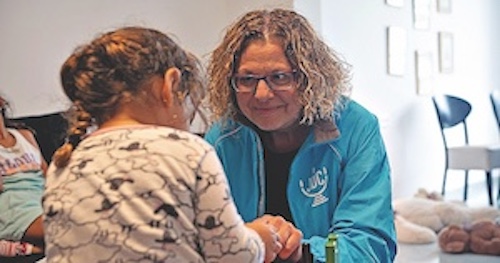
Hibuki is always introduced into a community via a member of Flora’s team who then passes on to teachers how to utilise the doll. The parents are also involved with their own round table group and that not only creates a way for them to understand how to help their child, but also becomes a form of therapy for them too. If a child comes to their parent and says the Hibuki had a nightmare the parent will know to say, ‘Please tell me what the dream was? And how do you think we can help Hibuki? Let’s think of way to make it better.’ It creates a dynamic that is helpful to the child but is also important in terms of their relationship to their parent.”
It is a complex process that takes money and time – so far, 2,000 of the dolls have been given out and the plan is to increase that to at least 10,000 with support provided by the United Jewish Israel Appeal (UJIA-UK) and the Jewish Federations of North American (JFNA).
Reut Matzrachi is a parent and nursery teacher in Ashkelon, which was originally evacuated after October 7, although most of its residents have returned. “I wish every young child in Israel could have a Hibuki,” she says. “The dolls become a like a friend to these children. A few weeks ago, a kid came in who was crying, he’d had a bad nightmare. The other children came up to him with a Hibuki and said: ‘Take Hibuki, he will calm you down.’
“The interesting thing is that after October 7 most of the parents thought their children were fine. But then they started hearing, ‘Hibuki misses his friends’ or ‘Hibuki misses his bed’ and they realised there was something else going on underneath.”
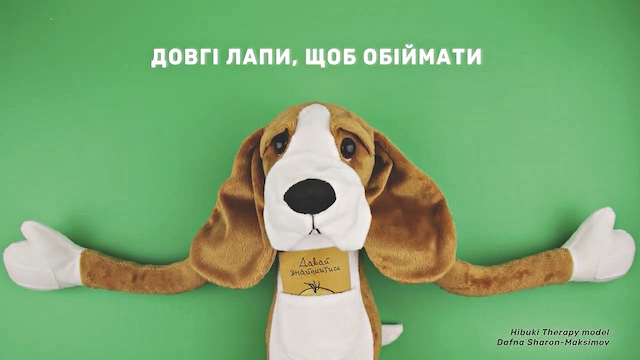
Hibuki has become world-famous – he helped Japanese children after the tsunami and other children of war in Ukraine. But for now, his main work is in Israel.The trauma affecting Israel is ongoing; the war continues on several fronts. And Hibuki is fighting that war, in his own special way.
“The children will be able to move forwards with this help and we find it is also a tremendous strength emotionally for the parents,” says Flora.“Studies show that if a child has been exposed to trauma, the quicker they get help and the more help they get, from both their parents and professionals, the more they are likely to overcome it. They will get through this and Hibuki will help them.”
For more information, visit jdc.org

Thank you for helping to make Jewish News the leading source of news and opinion for the UK Jewish community. Today we're asking for your invaluable help to continue putting our community first in everything we do.
For as little as £5 a month you can help sustain the vital work we do in celebrating and standing up for Jewish life in Britain.
Jewish News holds our community together and keeps us connected. Like a synagogue, it’s where people turn to feel part of something bigger. It also proudly shows the rest of Britain the vibrancy and rich culture of modern Jewish life.
You can make a quick and easy one-off or monthly contribution of £5, £10, £20 or any other sum you’re comfortable with.
100% of your donation will help us continue celebrating our community, in all its dynamic diversity...
Engaging
Being a community platform means so much more than producing a newspaper and website. One of our proudest roles is media partnering with our invaluable charities to amplify the outstanding work they do to help us all.
Celebrating
There’s no shortage of oys in the world but Jewish News takes every opportunity to celebrate the joys too, through projects like Night of Heroes, 40 Under 40 and other compelling countdowns that make the community kvell with pride.
Pioneering
In the first collaboration between media outlets from different faiths, Jewish News worked with British Muslim TV and Church Times to produce a list of young activists leading the way on interfaith understanding.
Campaigning
Royal Mail issued a stamp honouring Holocaust hero Sir Nicholas Winton after a Jewish News campaign attracted more than 100,000 backers. Jewish Newsalso produces special editions of the paper highlighting pressing issues including mental health and Holocaust remembrance.
Easy access
In an age when news is readily accessible, Jewish News provides high-quality content free online and offline, removing any financial barriers to connecting people.
Voice of our community to wider society
The Jewish News team regularly appears on TV, radio and on the pages of the national press to comment on stories about the Jewish community. Easy access to the paper on the streets of London also means Jewish News provides an invaluable window into the community for the country at large.
We hope you agree all this is worth preserving.
-
By Brigit Grant
-
By Laurent Vaughan - Senior Associate (Bishop & Sewell Solicitors)
-
By Laurent Vaughan - Senior Associate (Bishop & Sewell Solicitors)
-
By Laurent Vaughan - Senior Associate (Bishop & Sewell Solicitors)
-
By Laurent Vaughan - Senior Associate (Bishop & Sewell Solicitors)


